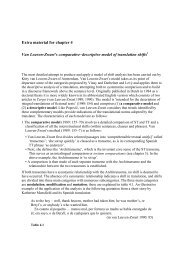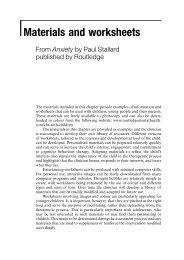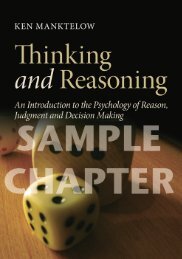Politics and International Relations 2011 (UK) - Routledge
Politics and International Relations 2011 (UK) - Routledge
Politics and International Relations 2011 (UK) - Routledge
Create successful ePaper yourself
Turn your PDF publications into a flip-book with our unique Google optimized e-Paper software.
New<br />
Strategy in Information <strong>and</strong><br />
Influence Campaigns<br />
How Policy Advocates, Social Movements,<br />
Insurgent Groups, Corporations,<br />
Governments <strong>and</strong> Others Get What They<br />
Want<br />
Jarol B. Manheim, George Washington University,<br />
USA<br />
‘Manheim has written an<br />
always readable <strong>and</strong> often<br />
startling guide to perhaps<br />
the greatest force presently<br />
shaping our world: strategic<br />
communication. Based on<br />
many decades of study this<br />
book draws together the<br />
wisdom of ages <strong>and</strong> the<br />
latest insights into the<br />
subject. It clarifies its<br />
operation with an impressive<br />
line-up of cases of the best<br />
(<strong>and</strong> the worst) of communication in practice. This<br />
is an invaluable text for scholars, students <strong>and</strong><br />
communication practitioners alike.’ - Nicholas J. Cull,<br />
University of Southern California, USA<br />
‘This is a masterful analysis of how influence<br />
campaigns <strong>and</strong> strategic communication work. No<br />
other book comes close in terms of scope, insight,<br />
<strong>and</strong> readability. Manheim has written a classic.’<br />
- Lance Bennett, University of Washington, USA<br />
Selected Contents: 1. Points of Origin 2. Information <strong>and</strong><br />
Influence Campaigns 3. Strategy <strong>and</strong> Tactics in Campaign<br />
Communication I: Winning the Argument 4. Strategy <strong>and</strong><br />
Tactics in Campaign Communication II: Shaping the Decision<br />
5. Networks <strong>and</strong> Netwaves: Organizing for Influence<br />
6. Riding the Waves: Strategy <strong>and</strong> Tactics in Network<br />
Activation 7. Feeling the Pressure: The Dimensionality of<br />
Targets 8. Guarding the Castle: Deterring, Deflecting,<br />
Minimizing or Defeating Information <strong>and</strong> Influence<br />
Campaigns 9. Information, <strong>and</strong> Influence. Appendix A.<br />
Need to Know: Strategic Intelligence <strong>and</strong> Research in the<br />
Campaign. Appendix B. The IIC Knowledge Base: A Selective<br />
Bibliographic Inventory. Appendix C. A Bibliography for IIC<br />
Strategy (Including Sources Cited)<br />
December 2010: 229 x 152: 344pp<br />
Hb: 978-0-415-88728-1: £100.00<br />
Pb: 978-0-415-88729-8: £29.99<br />
eBook: 978-0-203-83328-5<br />
For more information, visit:<br />
www.routledge.com/9780415887298<br />
Browse <strong>and</strong> order online: www.routledge.com/politics<br />
PoliticAl commuNicAtioN & PoliticAl Psychology<br />
New<br />
Making Sense of Media<br />
<strong>and</strong> <strong>Politics</strong><br />
Five Principles in Political Communication<br />
Gadi Wolfsfeld, Hebrew University of Jerusalem,<br />
Israel<br />
‘This lively <strong>and</strong> original<br />
synthesis of the research<br />
literature in political<br />
communication is at once a<br />
brilliant theoretical<br />
statement <strong>and</strong> a downright<br />
fun read. Wolfsfeld’s five<br />
basic principles about politics<br />
<strong>and</strong> the news don’t just<br />
summarize what we know.<br />
They distill the essential<br />
elements of how the system<br />
works into a new theoretical<br />
perspective that spells out why the most important<br />
things to underst<strong>and</strong> about politics <strong>and</strong> the media<br />
are not what we expect them to be. This small<br />
book is destined for greatness. If I were stuck on a<br />
desert isl<strong>and</strong> with a single book about political<br />
communication as my only possession, I’d want it<br />
to be this one.’ - Scott Althaus, University of Illinois<br />
Urbana-Champaign, USA<br />
In Making Sense of Media <strong>and</strong> <strong>Politics</strong>, Gadi Wolfsfeld<br />
introduces readers to the most important concepts that<br />
serve as a framework for examining the interrelationship<br />
of media <strong>and</strong> politics:<br />
• political power can usually be translated into power<br />
over the news media<br />
• when authorities lose control over the political<br />
environment they also lose control over the news<br />
• there is no such thing as objective journalism (nor can<br />
there be)<br />
• the media are dedicated more than anything else to<br />
telling a good story<br />
• the most important effects of the news media on<br />
citizens tend to be unintentional <strong>and</strong> unnoticed.<br />
Selected Contents: Part 1: Political Actors Compete<br />
Over the News Media 1. Political Power <strong>and</strong> Power Over<br />
the Media 2. Political Control <strong>and</strong> Media Independence<br />
Part 2: Turning <strong>Politics</strong> Into News 3. No Such Thing as<br />
Objective News 4. Telling a Good Story Part 3: Media<br />
Effects 5. The Media Get You When You’re Not Paying<br />
Attention<br />
February <strong>2011</strong>: 229 x 152: 164pp<br />
Hb: 978-0-415-88522-5: £100.00<br />
Pb: 978-0-415-88523-2: £25.99<br />
eBook: 978-0-203-83987-4<br />
For more information, visit:<br />
www.routledge.com/9780415885232<br />
Manipulating democracy<br />
Democratic Theory, Political Psychology,<br />
<strong>and</strong> Mass Media<br />
Edited by Wayne Le Cheminant <strong>and</strong><br />
John M. Parrish, both at Loyola Marymount<br />
University, USA<br />
Manipulating Democracy offers<br />
the first comprehensive<br />
dialogue between empirical<br />
political scientists <strong>and</strong> normative<br />
political theorists on the<br />
definition <strong>and</strong> contemporary<br />
practice of democratic<br />
manipulation. An impressive<br />
array of distinguished scholars<br />
offer incisive assessments <strong>and</strong><br />
far-reaching critiques of<br />
contemporary American<br />
democracy.<br />
Selected Contents: Introduction: Manipulating Democracy:<br />
A Reappraisal Wayne Le Cheminant <strong>and</strong> John M. Parrish<br />
Part 1: democratic Theory 1. Manipulation <strong>and</strong><br />
Democratic Theory James Fishkin 2. Manipulation: As Old As<br />
Democracy Itself (<strong>and</strong> Sometimes Dangerous) Terence Ball 3.<br />
When Rhetoric Turns Manipulative: Disentangling Persuasion<br />
<strong>and</strong> Manipulation Nathaniel Klemp Part 2: Political<br />
Psychology 4. Changing Brains: Lessons from the Living<br />
Wage Campaign George Lakoff 5. Emotional Manipulation<br />
of Political Identity Rose McDermott 6. Mimesis, Persuasion,<br />
<strong>and</strong> Manipulation in Plato’s Republic Christina Tarnopolsky<br />
Part 3: Mass Media 7. “News You Can’t Use”: <strong>Politics</strong> <strong>and</strong><br />
Democracy in the New Media Environment Richard Fox <strong>and</strong><br />
Amy Gangl 8. The Betrayal of Democracy: The Purpose of<br />
Public Opinion Survey Research <strong>and</strong> Its Misuse by Presidents<br />
Lawrence Jacobs 9. The Political Economy of Mass Media:<br />
Implications for Informed Citizenship Shanto Iyengar <strong>and</strong> Kyu<br />
Hahn 10. Exploiting the Clueless: Heresthetic, Overload, <strong>and</strong><br />
Rational Ignorance Andrew Sabl<br />
August 2010: 229 x 152: 280pp<br />
Hb: 978-0-415-87804-3: £100.00<br />
Pb: 978-0-415-87805-0: £30.99<br />
eBook: 978-0-203-85499-0<br />
For more information, visit:<br />
www.routledge.com/9780415878050<br />
Blogging the Political<br />
<strong>Politics</strong> <strong>and</strong> Participation in a<br />
Networked Society<br />
Antoinette Pole, Montclair State University, USA<br />
In an era of depressed civic<br />
engagement, where access to<br />
the media by common citizens<br />
is limited, blogs have the power<br />
to change the political<br />
l<strong>and</strong>scape. This book catalogs<br />
the individuals engaged in<br />
political blogging, explains why<br />
they started blogging, <strong>and</strong><br />
examines what they hope to<br />
gain from it.<br />
2009: 229 x 152: 176pp<br />
Hb: 978-0-415-96341-1: £85.00<br />
Pb: 978-0-415-96342-8: £22.99<br />
eBook: 978-0-203-86631-3<br />
For more information, visit:<br />
www.routledge.com/9780415963428<br />
79
















